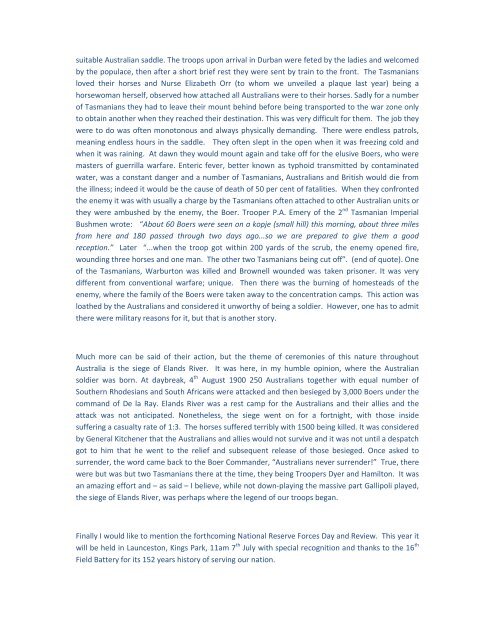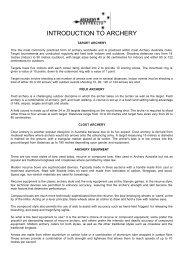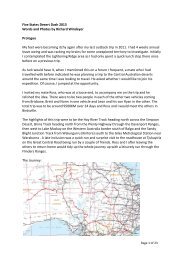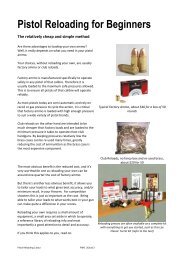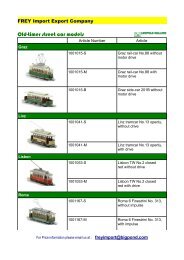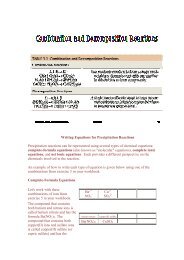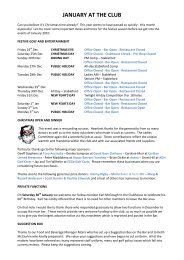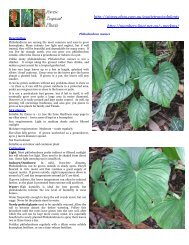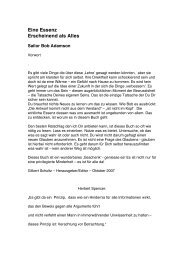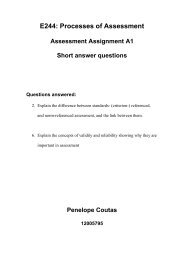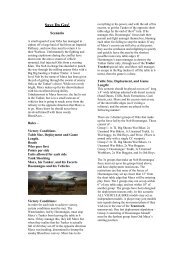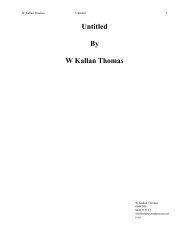available online
available online
available online
You also want an ePaper? Increase the reach of your titles
YUMPU automatically turns print PDFs into web optimized ePapers that Google loves.
suitable Australian saddle. The troops upon arrival in Durban were feted by the ladies and welcomed<br />
by the populace, then after a short brief rest they were sent by train to the front. The Tasmanians<br />
loved their horses and Nurse Elizabeth Orr (to whom we unveiled a plaque last year) being a<br />
horsewoman herself, observed how attached all Australians were to their horses. Sadly for a number<br />
of Tasmanians they had to leave their mount behind before being transported to the war zone only<br />
to obtain another when they reached their destination. This was very difficult for them. The job they<br />
were to do was often monotonous and always physically demanding. There were endless patrols,<br />
meaning endless hours in the saddle. They often slept in the open when it was freezing cold and<br />
when it was raining. At dawn they would mount again and take off for the elusive Boers, who were<br />
masters of guerrilla warfare. Enteric fever, better known as typhoid transmitted by contaminated<br />
water, was a constant danger and a number of Tasmanians, Australians and British would die from<br />
the illness; indeed it would be the cause of death of 50 per cent of fatalities. When they confronted<br />
the enemy it was with usually a charge by the Tasmanians often attached to other Australian units or<br />
they were ambushed by the enemy, the Boer. Trooper P.A. Emery of the 2 nd Tasmanian Imperial<br />
Bushmen wrote: “About 60 Boers were seen on a kopje (small hill) this morning, about three miles<br />
from here and 180 passed through two days ago...so we are prepared to give them a good<br />
reception.” Later “...when the troop got within 200 yards of the scrub, the enemy opened fire,<br />
wounding three horses and one man. The other two Tasmanians being cut off”. (end of quote). One<br />
of the Tasmanians, Warburton was killed and Brownell wounded was taken prisoner. It was very<br />
different from conventional warfare; unique. Then there was the burning of homesteads of the<br />
enemy, where the family of the Boers were taken away to the concentration camps. This action was<br />
loathed by the Australians and considered it unworthy of being a soldier. However, one has to admit<br />
there were military reasons for it, but that is another story.<br />
Much more can be said of their action, but the theme of ceremonies of this nature throughout<br />
Australia is the siege of Elands River. It was here, in my humble opinion, where the Australian<br />
soldier was born. At daybreak, 4 th August 1900 250 Australians together with equal number of<br />
Southern Rhodesians and South Africans were attacked and then besieged by 3,000 Boers under the<br />
command of De la Ray. Elands River was a rest camp for the Australians and their allies and the<br />
attack was not anticipated. Nonetheless, the siege went on for a fortnight, with those inside<br />
suffering a casualty rate of 1:3. The horses suffered terribly with 1500 being killed. It was considered<br />
by General Kitchener that the Australians and allies would not survive and it was not until a despatch<br />
got to him that he went to the relief and subsequent release of those besieged. Once asked to<br />
surrender, the word came back to the Boer Commander, “Australians never surrender!” True, there<br />
were but was but two Tasmanians there at the time, they being Troopers Dyer and Hamilton. It was<br />
an amazing effort and – as said – I believe, while not down-playing the massive part Gallipoli played,<br />
the siege of Elands River, was perhaps where the legend of our troops began.<br />
Finally I would like to mention the forthcoming National Reserve Forces Day and Review. This year it<br />
will be held in Launceston, Kings Park, 11am 7 th July with special recognition and thanks to the 16 th<br />
Field Battery for its 152 years history of serving our nation.


